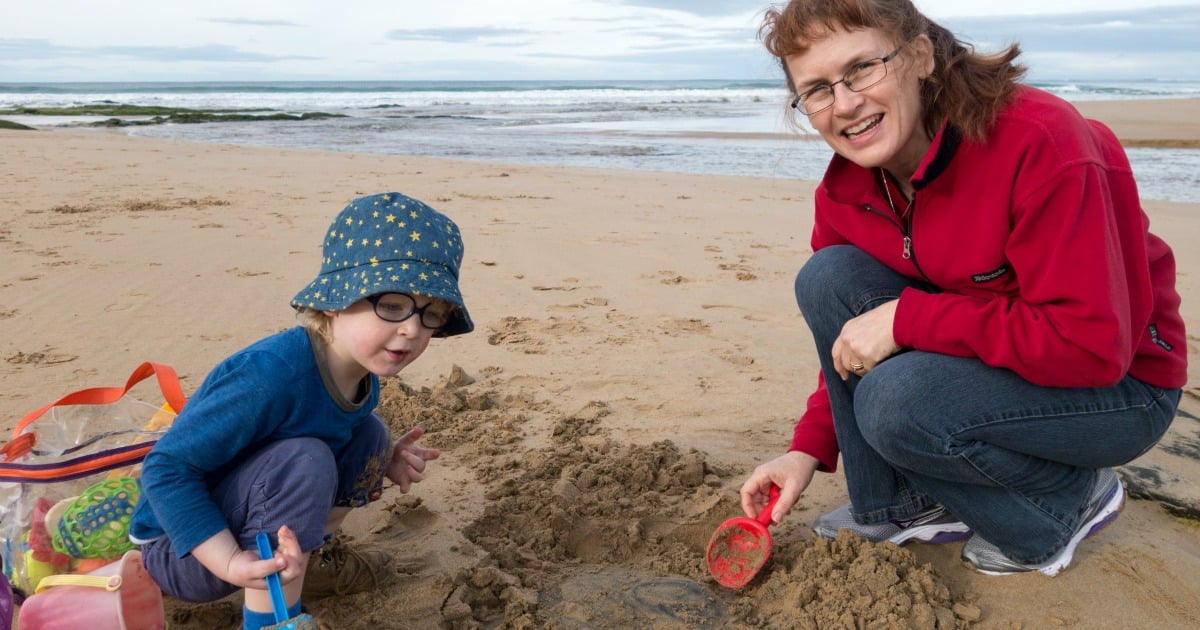
I’m driving south on Melbourne’s Western Ring Road, shouting. ‘Can you hear me?’
‘No,’ he says.
I try again, in capital letters this time. ‘I said, look at the digger.’
‘Where?’
‘Over there,’ I say, tapping at the side window before quickly returning my hand to the wheel. We’re driving past road works. There’s a lowered speed limit, which I’m obeying but some other cars aren’t. There are trucks—really big trucks—and there’s a concrete wall a few centimetres to our left.
He bursts into tears, howls. ‘I didn’t see it. Where’s another digger? Where’s another digger, Mummy?’
‘I don’t know. Please stop crying,’ I say.
We keep this up, or variations on it, all the way to Ballarat. Ninety minutes of me shouting, my son aged three-and-a-half not catching my words, or my not understanding his, which is worse. Over the past few months he’s developed an aversion to repeating himself and a sense of frustration at not being understood, in equal measure. So we drive and shout and occasionally scream (mostly him) and I try to speak clearly and slowly in order to develop his phonics and to show him the cows and horses and clouds and diggers, and try to not crash while I’m doing it.
His hearing loss is at 40 to 55 decibels down, depending on the ear and the tonal range of the sound. He has a common, treatable condition known as glue ear—basically gunk blocking his ears after infections as a baby. He’s not deaf, not even partially. He just can’t hear very well.


Top Comments
I think the author is completely overthinking this (and this is coming from someone who usually overthinks things! :-) ).
If your child couldn't see well and needed glasses would you get them? Getting grommets (apart from that they need surgical implantation) is basically the same thing. The grommets will fall out by themselves at some point in the future, but meanwhile your child, who it sounds like is a typical kid in every other way, will be able to hear. It is a tiny procedure that is usually done as day surgery, and makes a huge difference. He does not have a profound disability that requires all of the intervention your have mentioned - he simply needs grommets inserted to get rid of the roadblock in his normal hearing in a one day procedure and then his life will go along as usual (but better).
Some things require a lot of research and thinking, but this isn't one of them. Get the grommets - you'll be amazed at the difference and wonder why you ever contemplated going down such a hard stressful road of intervention when there is such an easy fix available to you now.
If you need any further push, may I ask how your child's balance is? Are they generally active? Does the glue ear also cost them sleep due to pain? Do they have to take plenty of antibiotics for frequent ear infections, and miss preschool too? You probably only answered yes to a couple of these questions, but don't forget the grommets are not only going to help hearing - you may have other issues that you don't realise will be resolved by the fluid balance being restored to it's correct levels.
Good luck!
An issue with sign is that most people don't know or understand it. So you and your family and his daycare will have to go to a whole heap of time and effort and hard work to learn sign, when he still won't be understood by others in the community, for a condition that will go away in a few years, and he will then be behind in his speech development. I agree with the others below-eep Rush's analogy with the broken leg and paralysed body. . You still won't be able to sign while you are driving, or if he's not looking at you....